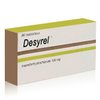 | Provigil Active Ingredient: Modafinil Provigil is used to treat excessive sleepiness caused by sleep apnea, narcolepsy, or shift work sleep disorder. |
INDICATIONS
Provigil (modafinil) is a medication that promotes wakefulness. It is thought to work by altering the natural chemicals (neurotransmitters) in the brain. This medicine is endorsed for managing sleepiness which is caused by sleep disorder and this tablet also has used to manage the depression symptoms like augmentation of memory and cognitive power.
INSTRUCTIONS
Take Provigil exactly as prescribed by your doctor. Follow all directions on your prescription label. Do not take this medicine in larger or smaller amounts or for longer than recommended.
Never share Provigil with another person, especially someone with a history of drug abuse or addiction.
Provigil is usually taken each morning to prevent daytime sleepiness, or 1 hour before the start of a work shift to treat work-time sleep disorders.
You may take the tablet with or without food.
Provigil is usually given for 12 weeks or less.DOSAGE
Usual Adult Dose for Narcolepsy: 200 mg orally daily in the morning
Usual Adult Dose for Obstructive Sleep Apnea/Hypopnea Syndrome: 200 mg orally daily in the morning
Usual Adult Dose for Shift Work Sleep Disorder: 200 mg orally daily one hour prior to the start of the work shiftTalk with your doctor about what to do if you miss a dose of Provigil. Avoid taking the medicine if you do not plan to be awake for several hours. Skip the missed dose if it is almost bedtime. Do not take extra medicine to make up the missed dose.
STORAGE
Store at room temperature away from moisture and heat.
Important information
You should not use Provigil if you have ever had an allergic reaction or skin rash while taking modafinil or armodafinil (Nuvigil).Before using Provigil, tell your doctor if you have angina (chest pain), liver or kidney disease, a heart problem, a history of drug addiction, if you take blood pressure medication, or if you have recently had a heart attack.
Before taking this Provigil
You should not use Provigil if you have ever had an allergic reaction or skin rash while taking modafinil or armodafinil (Nuvigil).
To make sure Provigil is safe for you, tell your doctor if you have:
angina (chest pain);
cirrhosis or other liver problem;
kidney disease;
high blood pressure, heart disease, or history of heart attack;
a history of mental illness or psychosis; or
history of alcoholism or drug addiction.
It is not known whether this medicine will harm an unborn baby. Tell your doctor if you are pregnant or plan to become pregnant.
Provigil can make certain birth control less effective. Hormonal contraception (birth control pills, injections, implants, skin patches, and vaginal rings) may not be effective enough to prevent pregnancy during your treatment. Talk with your doctor about the best methods of birth control to use while taking Provigil.
It is not known whether modafinil passes into breast milk or if it could harm a nursing baby. Tell your doctor if you are breast-feeding a baby.
Provigil is not approved for use by anyone younger than 17 years old.Other drugs may interact with modafinil, including prescription and over-the-counter medicines, vitamins, and herbal products. Tell each of your health care providers about all medicines you use now and any medicine you start or stop using.
Get emergency medical help if you have signs of an allergic reaction to Provigil: hives; difficulty breathing; swelling of your face, lips, tongue, or throat.
Provigil can cause skin reactions that may be severe enough to need treatment in a hospital. Stop taking this medicine and get emergency medical help if you have:
skin rash or hives, blisters or peeling;
mouth sores, trouble swallowing;
fever, shortness of breath;
swelling in your legs;
dark urine, jaundice (yellowing of the skin or eyes); or
swelling in your face, eyes, lips, tongue, or throat.
Stop using Provigil and call your doctor at once if you have:
depression, anxiety, suicidal thoughts or actions;
hallucinations, unusual thoughts or behavior, aggression, being more active or talkative than usual;
chest pain, trouble breathing, uneven heart beats; or
the first sign of any skin rash, no matter how minor you think it might be.
Common Provigil side effects may include:
headache, dizziness;
feeling nervous or anxious;
back pain;
nausea, diarrhea, upset stomach;
sleep problems (insomnia); or
stuffy nose.
This is not a complete list of side effects and others may occur. Call your doctor for medical advice about side effects.
 Tulsi SleepTwo sacred varieties of tulsi: krishna and vana, are blended with anti-stress healing herbs including brahmin, ashwagandha and shankpushpi, which also provide restorative energy needed for healthy sleep.as low as $22.66
Tulsi SleepTwo sacred varieties of tulsi: krishna and vana, are blended with anti-stress healing herbs including brahmin, ashwagandha and shankpushpi, which also provide restorative energy needed for healthy sleep.as low as $22.66 DesyrelDesyrel is used for treating depression.as low as $0.61
DesyrelDesyrel is used for treating depression.as low as $0.61 UnisomUnisom is used for treating occasional sleeplessness and reducing difficulty falling asleep.as low as $0.72
UnisomUnisom is used for treating occasional sleeplessness and reducing difficulty falling asleep.as low as $0.72 SominexSominex is used for relieving short-term sleeplessness due to minor aches and pains.as low as $0.63
SominexSominex is used for relieving short-term sleeplessness due to minor aches and pains.as low as $0.63 PhenerganPhenergan is used for relieving allergy symptoms, including hives or runny nose. It is used to prevent and control nausea and vomiting during and after surgery. It is also used as a sedative or sleep aid.as low as $0.42
PhenerganPhenergan is used for relieving allergy symptoms, including hives or runny nose. It is used to prevent and control nausea and vomiting during and after surgery. It is also used as a sedative or sleep aid.as low as $0.42 Slip InnValerian is a root extract that induces sleep and improves quality of sleep.as low as $1.77
Slip InnValerian is a root extract that induces sleep and improves quality of sleep.as low as $1.77